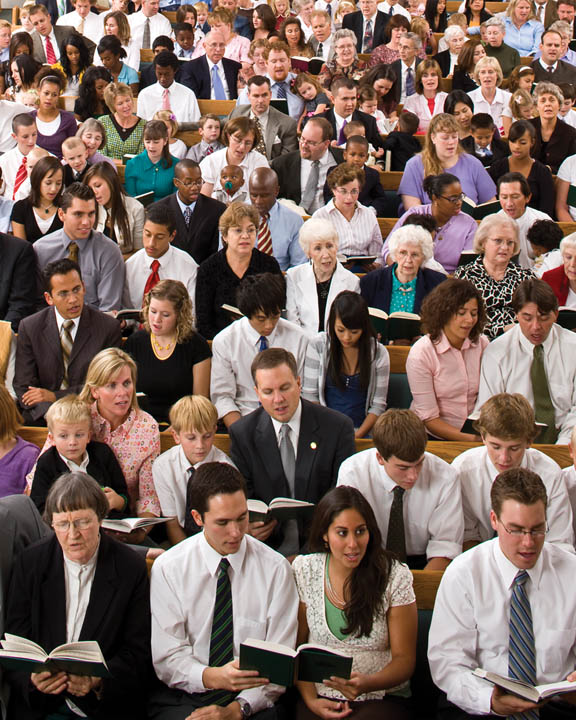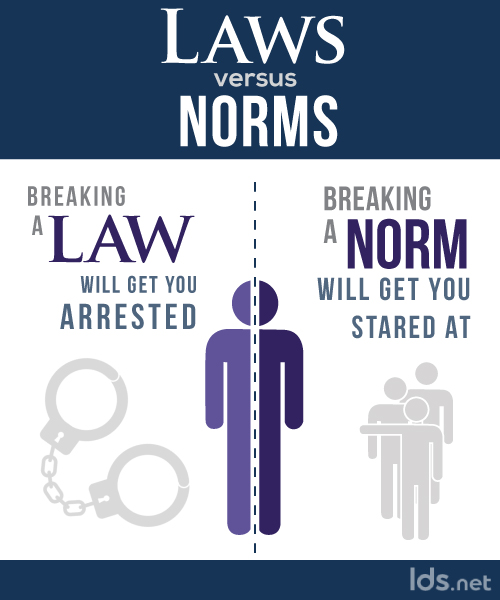Judging Others at Church and How It Can Stop
Why do some of us feel too judged to want to join with the Saints to worship, while others come to church in spite of the consciousness of their own imperfections? Why can Mormon culture seem hard to live up to? Why is standing out sometimes so difficult?

The Church of Jesus Christ of Latter-day Saints is the kingdom of God on earth, and it is a vehicle for perfecting the Saints, redeeming the dead, taking the gospel of Christ to the ends of the earth, and helping the poor and needy. Jesus Christ is our focus, and as we help Him with His work, we seek to become like Him.
Any time people come together for a purpose a culture evolves within their ranks, in this case a church culture. People in the association tend to adopt that culture, and loners of any type stand out. Those whose cultural differences make them stand out might feel judged, and they tend to fall into two categories:
- They really are being judged.
- They feel judged, even though others are not judging them.
Either way, there are challenges to be met. 
Are Other Members Really Judging You?
They might be. Although there are many scriptures on judging others and our leaders teach against it, people do it all the time. We must judge our environments and people around us in order to respond or act, but Christian charity is supposed to mitigate that. Judgment still occurs, but most of it is cultural judgment.
A really good example is found in the story of Aaron Olsen. While young men in the Mormon Church generally depart for a mission at age 18 or 19 and serve two years, some don’t go, and others, like Aaron, return early for some reason.
The reasons could be a serious family situation at home, illness, or breaking mission rules. Aaron served 10 months of his mission and was sent home to deal with depression and bi-polar disorder.
Aaron had loved his mission and felt like a failure when he was sent home. His feelings of confusion and failure were exacerbated by the ‘judgments’ from other people in the Church.
[quote_box_center] That doesn’t stop others from treating me like I am somehow less than I should be. For thousands of missionaries who come home early—whether due to rule infractions, health issues, or emotional struggles—much of the trauma lies in the treatment given by well-intentioned friends and neighbors.
After returning from 10 months of service, I received several letters and comments from friends and acquaintances urging me to “not give up” and “go back.” While generally understanding, the expectations set by others crushed my spirit. I wanted to go back. I loved my mission. I hoped and prayed that, above all else, I could get better and return to the field. And yet I knew that I would not return. I knew I was in over my head. The good-natured but misguided pressure to “just cheer up” hurt deeply.
I learned quickly to keep my mouth shut. At college the few people who bothered to pursue the subject of my age would not accept “20” as a legitimate answer. Some accused me of being dishonest. Those who didn’t would likely ask, “How can you be home from a mission? Did you even go? What did you do to get sent home?” The worst part? I was still trying to sort out those feelings myself.[/quote_box_center]

As Aaron learned to cope with his own feelings of disappointment in himself, he was able to see that most of the people who challenged him were well-meaning, but awkward. And yet, there were a few who really did see him as less than he should be.
While returning Mormon missionaries usually receive grand welcomes and accolades when they get home. Mormon missionaries who return early get no recognition at all, even for their months well-served.
Aaron provides advice for Latter-day Saints as they relate to missionaries who return early. Similar advice applies to those who have suffered some sort of loss and who are easily offended. There is work to do on both sides – for those who judge and those who feel judged.
It helps to realize that most judgments are made based on cultural norms. These are not eternal judgments. That makes them less important than the judgments of God, but they can still hurt.
Members of Every Culture Judge According to Cultural Norms
Our family lived in Jerusalem for eight years. Surprisingly (to most Americans), neighborhoods in West Jerusalem (the Jewish side) are mostly organized by the level of religious devotion. Imagine dividing the population into neighborhoods according to how religiously observant the residents are.
Would you have to move to fit in? Which members of your own ward would be your neighbors? Luckily, you wouldn’t have to judge. Your neighbors would judge themselves and live on the streets where they fit in.
In Jerusalem we lived in a mostly secular neighborhood, and you could tell it was mostly secular, because people dressed like Western secular people. In Orthodox Jewish neighborhoods men would wear a “knitted kippah” (also called a yarmulke or skullcap) symbolic of their devotion, and women dressed very modestly and covered their hair.
The residents would observe the Sabbath in the strictest sense, and the streets were closed to traffic on the Sabbath.
An ad for an apartment rental in an Orthodox neighborhood might say, “Nice apartment in knitted-kippah neighborhood.” If a man were to rent an apartment there and NOT wear a knitted kippah, you can bet he would be a curiosity and would feel judged. Every minute, his neighbors would wonder where his loyalties lay.
How faithful was he, really? Because Israelis are typically brave and brusque, he would surely get overt questions from total strangers.

In Ultra-Orthodox Jewish neighborhoods in Jerusalem the knitted kippah would not be enough. Men wear traditional clothing from their villages in the “pale of settlement” — Poland and Russia. Their hats are extremely expensive. Forbidden from carrying any objects except religious ones on the Sabbath, and therefore unable to carry umbrellas in the rain, Ultra-Orthodox men wear plastic grocery bags over their hats.

I think they look a bit strange. But since they all do it, it’s nothing to them. It’s a cultural norm they’ve all accepted. An Ultra-Orthodox man, then, might feel judged if he went out in the driving rain with no protection for his hat. He might really feel judged if he carried an umbrella out in the driving rain on the Sabbath, since he would be breaking Mosaic Law, according to the interpretation of those around him. .
The Difference between Laws and Norms
 Years ago, I took a psychology class at BYU. We were studying laws and norms and how they affect our behavior. A law is a written rule of society. If you break one, you could be fined or arrested. A norm is a cultural mode of behavior that everyone in a group thinks is normal. If you break a norm, you won’t be arrested, but you will stand out, for sure. People might judge you, and you might feel judged.
Years ago, I took a psychology class at BYU. We were studying laws and norms and how they affect our behavior. A law is a written rule of society. If you break one, you could be fined or arrested. A norm is a cultural mode of behavior that everyone in a group thinks is normal. If you break a norm, you won’t be arrested, but you will stand out, for sure. People might judge you, and you might feel judged.
Our assignment was to break a norm and then report on the experience. I found this extremely difficult. I was terrifically afraid to break any norm that came to mind. I was very pregnant at the time and finally decided to wear a form-fitting sweater to the grocery store at a time when only loose, blousy tops were considered acceptable.

It took some real nerve to get out of the car and even walk in. The mature ladies in the store looked me over with consternation and disapproval. Their negative judgment of me was very obvious. It wasn’t very long before I escaped back to my car. I could only stand their judgment for a few minutes. But nowadays, pregnant gals are wearing tight tees and even bikinis, and only the old ladies with ‘antiquated’ norms seem to care.
I wasn’t breaking any law, and really hadn’t done anything wrong. In order to comfortably wear a tight sweater while pregnant in the grocery store, I would need to decide whether I cared what other people thought. I felt judged because I did care — a lot, maybe too much. Self-consciousness and insecurity can make us feel judged and can make us shy away when we know others are judging us.
How We Can Help, Rather than Judging Others?
It is interesting that the top websites with advice on judging others are all religion-focused rather than psychology sites. However, the advice they give fits in the realm of psychology, as well.
- Our judgments of others give us information about ourselves. Self-examination can help us find those messages. If I am critical of a family that has just bought a huge house, what is that saying about me? Am I envious? Am I critical because I can’t afford to buy one myself? Do I assume that since they have indulged in a huge real estate purchase that they failed to also buy food storage? Do I label them as materialistic? Why?
- We may make statements we don’t realize sound like judgments to other people. Aaron Olsen fielded many questions from peers about his early departure from his mission. He perceived them to be judgments of failure. Some probably were, but others may not have been. Can we imagine the reactions of others before we say things that sound like judgments?
- Our judgments of others may be symptoms of our own insecurities. Again, self-examination is helpful. “I judge that person to be too loud, because I’m afraid to get out on stage myself.”
- We may judge others because we have the same faults but are blind to them.
- “Most judgments of others are ego strategies to avoid uncomfortable feelings. However, if you lack the awareness of where they come from, they can lead to even more discomfort down the line.” There is a difference between ‘discernment’ and ‘judging’ – “Discernment is awareness and understanding without an emotional response. Exercising discernment feels very different from getting your buttons pushed. Judgments that cause emotional reactions are clues to help you find personal insight.”

How Important are Mormon Cultural Norms?
It would behoove us to take a step back and take a hard look at the culture we are a part of. How does Mormon culture differ from Mormon doctrine? In other words, how does the Church differ from the gospel? Or how does religious culture differ from religion?
I have a friend who was really intimidated growing up in Utah as a Mormon. She had no natural talent for homemaking, arts and crafts, or any of those homey skills valued in Utah Mormon culture. She felt like a failure and was angry that “Mormonism” made her feel that way.
But I greatly admired her. She had served a mission, was well-versed in gospel principles from a young age, and had traversed the strait and narrow path, while I had wandered.
She was judging herself by cultural norms, not gospel ones. And really, those norms are unimportant in the eternal sense.
What are the norms of the society you live in? Are you intimidated by them? Which are important? Which are just? Which help you to be a better person? Can you judge yourself by eternal norms, rather than cultural norms?
Trying to Satisfy Many Cultural Norms at Once
After I graduated from college, I became a high school teacher of English, Creative Writing, and Psychology. The job was taxing, but I had a sense of importance as I touched the lives of hundreds of teenagers and made good use of my education.
My first child was in the care of a babysitter every day, and she took her first steps while I was at work. In the spring I found I was pregnant with our second child. Following the counsel of our Mormon leaders, I decided to be a stay-at-home mom.
I had been raised in a worldly, intellectually challenging environment. My parents’ non-Mormon household was adult-oriented and focused on science and service in the community. Being a Mormon mom of little kids was a new experience, and I tried to adapt.
But my feelings of inferiority increased, as I had no career by which to define my reason for living, and I didn’t feel up to the Mormon standards of happy homemaker.
It took years to realize that I was trying to please two disparate cultures at once. It was worldly culture that made me want to define myself by my career, and also to constantly diet and try to look good by worldly definitions. Looking back, I wish I could have just relaxed into my mommy-hood.
Are the norms of the world and the norms of the Church in conflict? If so, can you follow one set of norms without letting the others nag at you? Do we judge each other by both sets of norms?
Sometimes We Feel Judged, Because We Lack Self-Esteem
Paul H. Dunn, then a member of the First Quorum of the Seventy of The Church of Jesus Christ of Latter-day Saints said the following in a BYU address address about lack of self esteem:
[quote_box_center] I have noticed that daily we meet moments that steal our self-esteem. They are inevitable. Pick up any magazine; you see people who look healthier, skinnier, or better dressed than you are. Look around. There is always someone who seems smarter, another more self-assured, still another more talented. In fact, each day we are reminded that we lack certain talents, that we make mistakes, that we do not excel in all things. And amidst all this, it is easy to believe that we do not quite measure up in the great scheme of things, but are inferior in some secret way.
Underrating ourselves like this is not only painful but it is downright dangerous, for we limit the range of all possibility. We choke off our talents. And often we are dwelling on small faults of ours that, probably, others do not even notice….We are our own worst critics and believe others see us the same way.[/quote_box_center]
It is easy to measure ourselves against cultural norms and find ourselves wanting. This happens in every culture.
I recently read an article in the Deseret News called “This Used to Be a Sign of Poverty; Now It’s a Status Symbol.” The article is about Americans in the top 1.5% economic strata, in other words, really rich people. As a sign of their wealth, they are having more children.
Because they have adopted this family structure as a symbol of their prosperity, the people they associate with feel inferior—they feel judged, if they have fewer children:
Whatever the reason to have a large family, those parents who are unable to afford, don’t want or can’t have multiple children sometimes feel judged, especially if they have affluent neighbors with three or more kids, according to the Boston Globe.
“I get the sense that (people think) we’re choosing to have one child because we don’t love our son as much as people with multiple children, and it drives me nuts,” Jennifer Rego told the Globe. “One woman came up to me at Trader Joe’s and, ‘Oh, how could you deprive him? You’ll change your mind.’ ”
Interesting that Mormon parents with few or no children also sometimes feel judged, but for entirely different cultural reasons. Mormons tend to have larger families no matter what their economic standing, so those who don’t feel like they stand out.
How do we react to the childless couple in our ward? Do we constantly wonder what the problem might be? Are they choosing to be childless? Have they tried this or that in order to conceive? Is it really any of our business?

Self-Deprecation Stops our Spiritual Progress
I went through a prolonged period when I was down on myself 24/7. After a time, I realized that I was making no spiritual progress at all. Self-deprecation is not the same as humility. True humility – knowing we are nothing without God and everything with His help – makes us teachable and enables our progress, empowering us along the way. Self-deprecation stops us in our tracks.
Self-deprecation turns us inward and can produce in us attributes of pride. We are injured by our own self-criticism, we imagine that others are criticizing us, and we become easily offended.
Decreasing Self-Judgment and Building Self-Esteem
Psychologist Lisa Firestone tries to make us aware of our “inner voice” (which Latter-day Saints need to distinguish from the promptings of the Holy Spirit). What does this inner voice say to us? Has it become our “inner critic”? Does it tell us we are worthless, untalented, ungifted, unable to improve, too fat, too thin? Dr. Firestone suggests four ways to quiet our inner critic:
- Identify your inner critic – “Try to identify what your critical inner voice is telling you. Acknowledge that this thought process is separate from your real point of view. Remember that your critical inner voice is not a reflection of reality. It is a viewpoint you adopted based on destructive early life experiences and attitudes directed toward you that you’ve internalized as your own point of view.”
- Separate from your inner critic – “One way to help you differentiate from your critical inner voice is to write these thoughts down in the second person (as “you” statements). For example, a thought like “I can’t get anything right. I’ll never be successful” should be written as “You can’t get anything right. You’ll never be successful.” This will help you see these thoughts as an alien point of view and not as true statements. Notice how hostile this internal enemy can be.” (Latter-day Saints should be aware that these are statements Satan wants us to believe. Our Heavenly Father nurtures us; He never diminishes us.)
- Respond to your inner critic – “You can respond to your inner critic by writing down a more realistic and compassionate evaluation of yourself. Write these responses in the first person (as “I” statements). In response to a thought like, “You’re such an idiot,” you could write, “I may struggle at times, but I am smart and competent in many ways.” This exercise isn’t meant to build you up or boost your ego but to show a kinder, more honest attitude toward yourself.”
- Don’t act on your inner critic – “Remember not to act on the directives of your inner critic. Take actions that represent your own point of view, who you want to be and what you aim to achieve. Your critical inner voice may get louder, telling you to stay in line or not to take chances. However, by identifying, separating from, and acting against this destructive thought process, you will grow stronger, while your inner critic grows weaker.”

We are fortunate that we don’t have to tackle an exercise like the above all by ourselves. Prayer and scripture reading can lead us to revelatory experiences about life, about ourselves, and about the attitudes and points of view that make us feel judged and stop our spiritual progress.
Do what it takes to discover that God loves you (and that He loves all the people you feel are judging you, too). Look up (to God) to see how you are doing, and not from side to side to your peers.
[quote_box_center] The dignity of self is greatly enhanced by looking upward in the search for holiness. Like the giant trees, we should reach up for the light. The most important source of light we can come to know is the gift of the Holy Ghost. It is the source of inner strength and peace.
I have seen human dignity and self-worth expressed eloquently in the lives of the humblest of the humble, in the lives of the poor as well as in the lives of the formally educated and the affluent. The fruits of the search for holiness in their lives have been transparent, expressed through their inner dignity, their feelings of self-respect and personal worth.[/quote_box_center]
Take account of your progress and your successes, no matter how small.
Remember that it is human nature to root for the underdog. Is that you? Then let others rejoice with you in your small leaps of progress. This is more exciting to people than watching highly accomplished persons. Your little achievements could greatly inspire others, if you allow them to be a part of your forward, upward movement.
That means you must be open about your struggles, which is hard, but it can pull in a cheering section that can help you along.
Do something for someone else to get your mind off yourself, but don’t serve yourself into “martyr syndrome.” You were never meant to sacrifice yourself completely for others – Christ has already done that. Use His grace to get through your daily responsibilities, but take the time to refill your body and soul. Take rest and refreshment physically and spiritually.

Obedience to God’s commandments can lift your confidence before God and Man. Personal obedience combined with forgiveness toward others brings us unto Christ. However, remember that even though our works can make us who we are, God does not keep a running tally of our efforts to judge us by, and you don’t have to, either.
Mormons DO a lot (Visiting Teaching, Home Teaching, etc.), but it is better to BE (loving, kind, forgiving). Be yourself. Be in tune. Be where God can reach you – in church, in the temple, in front of your scriptures.
How Can We Help Others Feel Less Judged?
Striving to be more Christ-like can help us judge less and become more charitable. Charity, the pure love of Christ, is a gift that we can pray for. Let’s pray for that gift.
We can be aware that the gifts God gives us are various and that there are lots of them. Some are so obvious, but some are very quiet and shine under the surface.
We can be cheerleaders for the fallen who are trying to get up as well as for those who are taking their first steps. After all, we are all in this together, and we all have the potential for greatness. While we are cheering for others, let’s cheer for ourselves, too.


